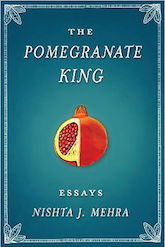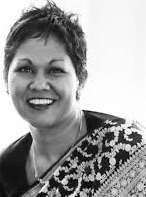The Pomegranate King
Nishta J. Mehra
|
|
The Pomegranate King by Nishta J. Mehra is the autobiographical collection of essays of a first-generation immigrant, her parents, and their struggle to understand one another. Nishta is only twenty-three when her father unexpectedly passes away. They had only just started to rebuild their relationship after it hit a rocky start when she told him that she is a lesbian. There are four stages to Mehra’s collection: “Identity,” “Death,” “Community,” and “Belief.” In these essays, Mehra explores who she is, how her father affected her, what family means to her, and why she still holds onto this life. The first collection of essays, “Identity,” deals with Mehra’s search for who she is and who her parents were. Nishta was born and raised in Memphis, Tenessee, a completely different planet from Amritsar, India, a small city near the northwest border of Pakistan. As a result, for most of her life, Nishta understood the New World, but did not fully understand her parents’ world. The only way she finds she is able to connect with them is through food—American food, Indian food, British food, smells, sights, feelings and sounds. Food is what brings her family together. Her mother cooks it and her father sings poetry about it. Pomegranates are my favorite fruit and my father always peeled them for me. He is not a particularly domestic man, so this was the only time I ever saw him wear an apron, seemingly wine-stained and spattered with red, tied delicately around his waist. He bought the fruit by the case and shucked them, like pearl-laden oysters, by the half-dozen. Mehra paints this scene beautifully. Her father is delicate with the fruit—he holds the pomegranate up like a special feast, even though it will only be a snack for the day. He treats food like magic. It is part of his culture, and so it is one of his rituals of life. This ritual also becomes Nishta’s ritual. In the aftermath of his death, Nishta searches for clues to who her father was and why he could not accept her. “Now he is dead, I find it is my turn to pick my father out of the past, seed by seed, one by one, seemingly endless nooks and crannies. A different kind of harvest.” She eloquently depicts their shared love of food with her search for the parts of her father she never knew. These essays are really about this rediscovery. For every meal Nishta cooks and every cup of tea she drinks she imagines her father’s words, she remembers her father’s actions. He is always there with her. Food is prayer to her father. Her life is shaped by two languages and two cultures. She too must fight for a life of her own within these three lives. She rebels, slightly, but still feels the need to remain respectful to her parents who fought so hard to get her to the land of plenty. This is how many first-generation immigrants feel. When Nishta finally does come to terms with the fact that she is a lesbian, she is terrified to tell her parents. Their language does not even have a word for lesbian. Instead, she hides her lovers and keeps her conversations with them strictly school-related. These chapters are described with fear and trepidation; The fear of being exposed and the trepidation of becoming something that her father would no longer be proud to call his own. When she finally does tell him, his reaction is that of silence rather than anger. It’s like he loved me in spite of himself; he wanted to be mad at me, but now that we were face-to-face, he couldn’t pull it off. And I couldn’t either. Of course my mind kept racing ahead, refusing to stay present, flitting in and out of future conversation, to the likely fact that my father was never going to approve of my life, never happily hug Jill, never be excited to come to Thanksgiving dinner at our house. And I didn’t know what to do about it. Nishta faces her fears and shows her true self to her father, and he will not even discuss it with her. He refuses to acknowledge half of her person, which keeps them from ever having a full relationship. Because Mehra is looking back on this relationship through the lens of the death of her father, she too is filled with guilt that she could not do more. It is a life cut short. Her father was stubborn, but Mehra also depicted him as a loving and forgiving man. The collection of essays titled “Death” are by far the most difficult to read. Mehra describes how she felt in the two weeks between the time when her father was bright, happy, and alive, to the time that he laid in a hospital bed removed of all tubes except morphine. These essays are particularly upsetting because the essays before told of happier times, of trips to India and discovering oneself. Mehra describes how she felt as if she and her father were finally beginning to understand each other, and then he passes away. She had not finished learning from her father and he had not finished learning from her. Mehra writes of the search for more time when there is no time left. In India she sees for the first time the house her father grew up in, the destitution he rose out of. She walks on his streets and eats his street food. She meets her family for the first time. Then, shortly after their return, she watches him die. Her sense of understanding of the world is torn apart. Grief guides her every emotion and she finds it difficult to find comfort in even the condolences of others. They cannot fully understand her. They do not know how she feels. Her life is changed. When someone dies, you begin to think about the project of wrapping their life, your lives together, gliding an index finger down a ledger of accounts, taking inventory, making a reckoning… As supposedly self-aware as I was, it took my breathing the air on the complete other side of the world for me to see my father’s life for what it was. In her small town, she sees this image in every pitiful smile and a “we’ll pray for you” from a friend or relative. It is only in repetition and the strength of her family that she eventually finds comfort. Mehra guides readers through her struggle to overcome her father’s death like a war-torn soldier. She has seen far too much and can never go back, but she can learn and grow. Through her family she learns more about who Subhash Chander Mehra was and grieves along with her family, rather than separate from them. The final two collections of essays, Mehra writes fondly of her mother’s childhood, and the community she formed on her own. These essays are thankful and nostalgic, a look back on her happy years and those who have supported her. In the years following her father’s death, Nishta marries her partner, Jill, and adopts a son. She describes with beautiful detail her love story, their separate lives, and how they intersect and parallel each other. Jennifer Teeter-Moore | September 14, 2015 | The California Journal of Women Writers
|


 Nishta J. Mehra
Nishta J. Mehra